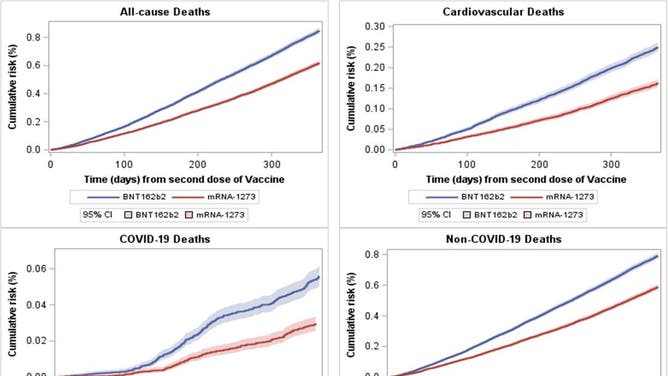New Study Has Concerning Conclusions On COVID Vaccination Side Effects
One of the most repeated messaging lines from the "experts" and their media partners during the pandemic was that COVID vaccination was "safe and effective."
"Safe and effective" was everywhere. Every mention of the Pfizer or Moderna mRNA vaccines was prefaced with the same repetitive catchphrase. Any time the media referenced someone who even slightly acknowledged publicly that they had not been vaccinated, like say, Aaron Rodgers or Novak Djokovic, they would finish their report by saying that the vaccines were safe and effective.
Why would anyone not get vaccinated, they'd ask incredulously, when the science and Anthony Fauci have confirmed that they're safe and effective?
Over time, more and more evidence emerged that the vaccines did in fact have concerning side effects, even if they are relatively rare. And perhaps more importantly, evidence also emerged that the vaccines weren't nearly as effective as the narrative campaign claimed.
READ: Natural COVID Immunity More Powerful Than Vaccination, Contradicting 'Experts' Yet Again
Add another piece of research confirming that Fauci and his media allies were wrong.

Dr. Anthony Fauci, White House Chief Medical Advisor and Director of the National Institute of Allergy and Infectious Diseases, attends an event with First Lady Jill Biden to urge Americans to get vaccinated ahead of the holiday season, during a COVID-19 virtual event with AARP in the Eisenhower Executive Office Building in Washington, DC, December 9, 2022. - The First Lady is hosting a virtual town hall event to talk about the importance of getting an updated Covid-19 vaccine this holiday season, especially for Americans ages 50 and older. (Photo by SAUL LOEB / AFP) (Photo by SAUL LOEB/AFP via Getty Images)
Mortality Risks Elevated For Pfizer Vaccine Recipients
A massive new study was just released out of Florida, with Dr. Joe Ladapo, the state's Surgeon General, as a co-author, with some concerning conclusions about COVID vaccination. Especially Pfizer's mRNA vaccine.
This study compared over 9 million Florida residents who received either the Pfizer or Moderna vaccines, and importantly, all-cause mortality outcomes. Not just how those recipients fared with COVID outcomes, but the results afterward from any mortality outcome. They weren't great.
Per the researchers, the idea underpinning the study was to have a more high-powered comparison between vaccinations as it relates to all-cause mortality, because the initial published studies funded by the pharmaceutical companies were underpowered relative to answering that question.
"Pooled data from the initial, pivotal randomized trials evaluating BNT162b2 (Pfizer BioNTech) and mRNA-1273 (Moderna) COVID-19 vaccines were underpowered to detect differences in overall mortality compared to placebo," the study says. "Moreover, no trial was conducted to compare the relative effects of different vaccines. While findings from these trials suggested that both vaccines reduced deaths due to COVID-19, pooled all-cause deaths were not reduced. Cardiac deaths were more frequent, with a relative but statistically insignificant increase of 50% and 40% compared to the placebo groups among BNT162b2 and mRNA-1273 vaccine recipients, respectively."
That's an important outcome to measure! And thankfully, they did.
Before getting into the results, the authors pointed out that many of the observational studies conducted on COVID vaccine outcomes can be impacted by the "healthy vaccinee bias." Essentially, healthier people were more likely to get vaccinated, therefore positive benefits attributed to the vaccines could be inaccurate because of better underlying health among that specific population.
"Nonspecific vaccine effects can be directly assessed in observational studies by evaluating a vaccine’s impact on all-cause mortality and other outcomes," they write. "However, the results of these studies are prone to multiple biases, including healthy vaccinee bias, i.e., observed and unobserved characteristics that have a confounding effect on the decision to vaccinate and an outcome. As a result, they often have relatively low reliability. Moreover, healthy vaccinee bias, likely the result of substantial unobserved differences between vaccinated and unvaccinated individuals, were demonstrated in observational studies of COVID-19 vaccination, even in studies using matching or risk adjustment."
This study, using matched cohort methodology, was able to avoid such bias.
"Nonspecific vaccine effects may also be indirectly assessed by evaluating health outcomes among patients who receive different vaccines for the same indication. This type of comparison is less likely to be vulnerable to healthy vaccinee bias and has already been demonstrated for COVID-19 vaccines."
And when using this methodology, a broad sample size, and examining all-cause mortality, the authors found that, sure enough, the "safe and effective" messaging wasn't entirely accurate.
Of the 9.1 million noninstitutionalized, meaning adults not in nursing homes or assisted living facilities, over 5.3 million received the Pfizer vaccine, with 3.8+ million getting the Moderna shot. Given the necessary criteria for matching, which covered seven categories, just over 1.4 million vaccine recipients were matched 1-1.
Turns out, those who received the Pfizer vaccine had a significantly higher risk of all-cause mortality. In the study period, which covered individuals who received two doses of COVID vaccine starting Dec. 18, 2020 to Aug. 31, 2021, Pfizer vaccinees had a 847.2 deaths per 100,000 rate, compared to 617.9 per 100,000 for Moderna. There was a similar gap in cardiovascular mortality rate.
Those with Pfizer vaccines had a 248.7 per 100,000 cardiovascular mortality rate, vs. 162.4 for Moderna vaccine recipients.
It was the same story with COVID-19 mortality and non-COVID mortality. COVID deaths for Pfizer were 55.5/100,000 vs. 29.5 for Moderna, and non-COVID rates were 791.6 for Pfizer and 588.4 for Moderna.

Cumulative incidence of all-cause, cardiovascular, COVID-19, and non-COVID-19 mortality in matched cohort. The cumulative incidence up to 365 days after the second dose of vaccine for all cause, cardiovascular, COVID-19, and non-COVID-19 are shown in the top left, top right, bottom left, and bottom right panels, respectively. Cumulative incidence was calculated using Kaplan Meier method and the follow-up ended either at the date of death or end of study observation period (365 days from second dose of vaccine). For cause-specific cumulative incidence, deaths from all other causes were censored at the time of death.
What does this all mean? Well, per new research, those who received the Pfizer vaccine had, in the author's words, "significantly higher risk of 12-month all-cause, cardiovascular, COVID-19, and non-COVID-19 mortality compared to matched mRNA-1273 recipients.
"These findings are suggestive of differential non-specific effects of the BNT162b2 and mRNA-1273 COVID-19 vaccines, and potential concerning adverse effects on all-cause and cardiovascular mortality. They underscore the need to evaluate vaccines using clinical endpoints that extend beyond their targeted diseases."
Essentially, what this study demonstrates is that there's a distinct possibility that those who received it, especially the Pfizer vaccine, could have suffered from adverse side effects that contributed to all-cause and heart-related mortality rates.
Maybe the "experts" should have waited a bit longer before running with the "safe and effective" messaging line after all. Vaccine efficacy fell to zero, particularly against infection, with the advent of new and more transmissible variants. When rigorous criteria is applied, safety and efficacy against severe outcomes does not always align with the prevailing pandemic wisdom.
As is and was so often the case, with masks, schools, lockdowns and many other absurd COVID policies, those who set "the science" were wrong. With catastrophic results.